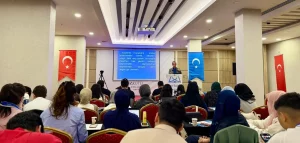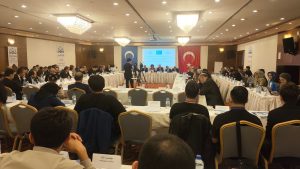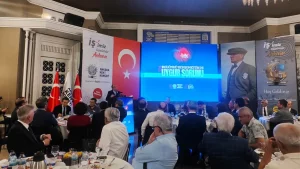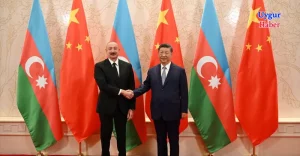The training program titled “International Conjuncture and Uyghur National Struggle” was held in Istanbul, where Uyghur youth attended two days of sessions focused on national struggle strategies and identity awareness.
Organized by the Uyghur Academy to cultivate pioneering individuals in the East Turkistan struggle, the sixth session of the long-term training program titled “International Conjuncture and Uyghur National Struggle” took place on July 5–6, 2025, at the Uyghur Academy’s office in Sefaköy, Istanbul. Nineteen Uyghur youth residing in Istanbul participated.
During the two-day program, topics such as diaspora identity, cultural preservation, media influence, propaganda and manipulation strategies, and the future role of youth were addressed by scholars and experts. Speakers included Prof. Dr. Erkin Emet, Prof. Dr. Alimcan Inayet, Assoc. Prof. Dr. Nimetjan Mehmet Orhun, Dr. Mehmet Emin Bektimur, and Dr. Yakup Uluyol.
The program opened on Saturday, July 5, with a comprehensive presentation by Prof. Dr. Erkin Emet of Ankara University, covering the history and key strategies of the Uyghur diaspora’s struggle against China. He was followed by Prof. Dr. Alimcan Inayet of Ege University, who emphasized the importance of forming and embracing a shared national ideal based on historical and political foundations. He also detailed the framework, scope, goals, and aspirations of the national vision he developed. The day’s final session featured Assoc. Prof. Dr. Nimetjan Mehmet Orhun from Yıldırım Beyazıt University, who addressed the dangers of drug use among Uyghur youth in a lecture titled “Uyghur Youth and Drugs: Harms and Prevention Strategies.”
The program continued at the same venue on Sunday, July 6. In the morning session, Dr. Mehmet Emin Bektimur, Assistant Professor at Istanbul Gelişim University, delivered a comprehensive presentation on media strategies through his lectures on propaganda and manipulation. In the afternoon session, Dr. Yakup Uluyol, China Researcher at Human Rights Watch, addressed topics such as the self-development of Uyghur youth in the diaspora, the roles they may assume in the future, global human rights advocacy, and political representation.
Officials from the Uyghur Academy emphasized that the training program serves not only as an academic initiative but also as a vital platform for strengthening cultural solidarity and contributing to the building of a shared future. Raising awareness and encouraging responsibility among Uyghur youth on national issues remain central goals of the program.
Following the enthusiastic participation in the sixth session, the seventh installment of the training program is planned for next month.
Please credit the source if you copy or republish this article.







Be First to Comment